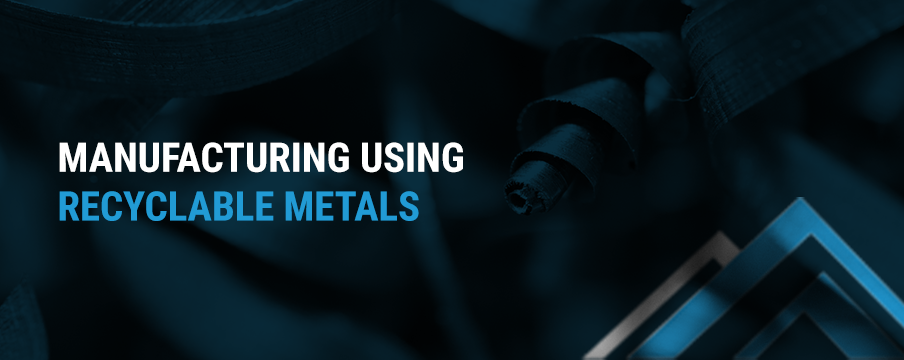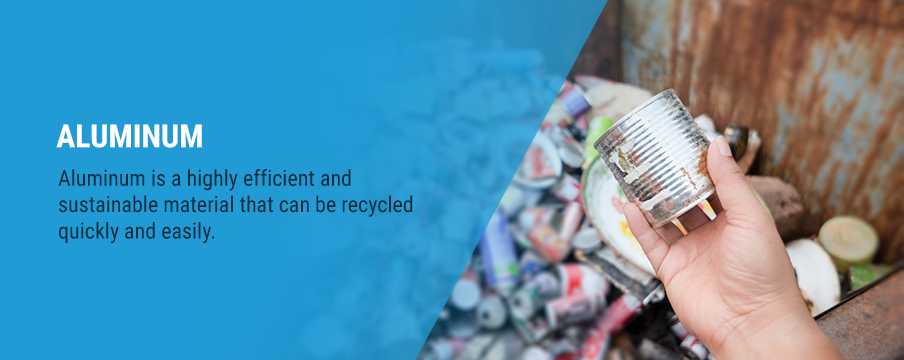 Understand Your Environmental Impact
Understand Your Environmental ImpactThe first step to sustainability is identifying the areas you can improve. Examine your energy consumption and its environmental impact. Look at your current processes and consider the materials you use in production to see if there are more eco-friendly alternatives.
Using recyclable and recycled materials in your manufacturing processes also can help your company become more environmentally friendly and save money without making any sacrifices in the quality of your materials.
Metal is highly recyclable and can be recycled repeatedly without losing its beneficial properties. Because of this, manufacturing using recycled metal is an easy way to boost your company’s environmental performance and bottom line.
Many different types of metal are recyclable, including steel, aluminum, brass and titanium. At Caldera Manufacturing Group, formerly Summit Steel, all of the raw materials we use to manufacture parts are recyclable, so the components we make don’t have to end up in a landfill at the end of their useful life. We believe it is our responsibility to protect the environment, and we have the knowledge, skills and equipment needed to operate in an environmentally responsible manner.
Because metal can be recycled repeatedly without degradation of its properties, manufacturers can use it for almost all of the same things they would use new metal for. Recycled metal can serve as the raw material for a vast range of new products, from automobile parts and screws to cans and bicycles. Once those products are recycled, those same raw materials can be used to make a new product.
Most metals can be recycled, meaning metal is often an eco-friendly manufacturing material. Some of the recyclable metals that Caldera Manufacturing Group uses include:
Steel is one of the most environmentally friendly and recyclable materials available. It’s also durable, so steel components may require replacement less often, adding to its environmental benefits and cost-effectiveness.
It’s used for producing a wide range of products, including car parts, industrial machinery, buildings, water tanks, appliances, cans and much more. Manufacturing using recycled steel has significant environmental benefits. Recycling one ton of steel conserves 120 pounds of limestone, 1,400 pounds of coal and 2,500 pounds of iron ore.

Brass, a combination of copper and zinc, is popular for its appearance, ductility, resistance to bacteria and other features. It’s often used for doorknobs, keys, plumbing, gears and bearings, as well as in medical applications. Brass is recyclable, and because of the copper in it, you can typically get more money for it when you recycle it.
Titanium is also recyclable and almost as strong as steel, but less dense. It’s often alloyed with other metals such as aluminum and iron and is used to build aircraft and spacecraft because of its low density and resistance to extreme temperatures. It’s also used in products such as crutches, golf clubs and laptops.
There are several benefits to using recycled metals for manufacturing your products, including:
Metals like steel, aluminum, brass and titanium don’t lose their quality or beneficial properties when recycled. You can truly use these materials endlessly, and they will retain their quality no matter how many times they are recycled.
Using recycled metals can be a key part of a sustainable manufacturing strategy. Recycling old metal components and metal scrap helps prevent materials from going to the landfill. It also avoids the energy and associated emissions required to produce new metal, which can be quite a substantial amount.
Using recycled materials can also provide your company with significant economic benefits. Using recycled metals is typically cost-effective, and reusing, selling or recycling scraps produced during the manufacturing process can help you recover some costs and avoid waste.
Improving your company’s environmental performance by using recycled materials can also improve your company’s reputation, potentially leading to more sales, investment and opportunities. Companies seeking to improve their environmental performance are more likely to choose to work with a company that uses recycled materials.
Metal recycling also produces significant economic benefits on a broader scale. By 2026, the market for recycled metal is expected to grow to approximately $950 billion.
According to the U.S. Environmental Protection Agency (EPA), 18.9 million tons of ferrous metals, which include steel and iron, entered the municipal solid waste system (MSW) in 2017, which accounted for 7.1 percent of total MSW generation. Approximately 27.8 percent of ferrous metals in durable goods, which include appliances, furniture and tires, were recycled.
The recycling rate for steel cans, according to the EPA’s estimates, was 70.9 percent, and 420,000 tons of other steel packaging, including strapping and drums, was also recycled in 2017. Over 10 million tons of steel was sent to landfills, which represents 7.5 percent of landfilled MSW.
The market for recycled non-ferrous metals, which include aluminum, brass, titanium and other metals, was estimated to be worth $90 billion in 2018. According to the EPA, aluminum accounted for 3.8 million tons of MSW generation in 2017, which was 1.4 percent of total generation. Almost 2 million tons of this was aluminum packaging and containers, and 1.9 million tons came from durable and non-durable goods.
The recycling rate for aluminum packaging and containers, the EPA found, was 32.8 percent. In total, 620,000 tons of aluminum were recycled. According to the EPA’s estimates, 10.4 tons of aluminum ended up in landfills, accounting for 7.5 percent of landfilled MSW.
Other non-ferrous metals, which include copper, lead and zinc, accounted for 2.3 million tons of MSW in 2017, according to the EPA, with lead from batteries making up a significant portion of these metals. Recycling of these metals totaled 1.5 million tons.
At Caldera Manufacturing Group, we offer eco-friendly manufacturing using recyclable materials, including stainless steel, carbon steel, aluminum, brass, and titanium. We’re a single-source supplier, and our metal fabrication services include CNC machining, laser cutting, centerless grinding and polishing, saw cutting, welding and more.
For high-quality, efficient metal fabrication services that help improve your company’s environmental performance, turn to Caldera Manufacturing Group. To learn more about our services, contact us today.